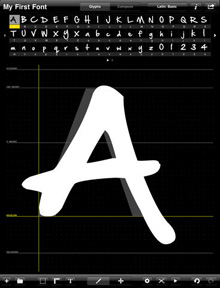 Have you ever thought about where fonts come from? They’re just on your computer, right? But, how do they get there and who created them? Is it possible to make your own?
Have you ever thought about where fonts come from? They’re just on your computer, right? But, how do they get there and who created them? Is it possible to make your own?
As a former first grade teacher, I made a lot of charts in my classroom. Teachers, and students, would tell me all the time that I had really nice handwriting. I didn’t really think too much about the compliments until I purchased my first iPad a few years ago and stumbled upon a font creation app in the App Store called “iFontMaker.” This purchase was a major game-changer for me and my students and was an inexpensive investment for the high yield return.
Basically, the app turns your handwriting into a font. The app provides one space per letter, punctuation mark or symbol, which the app calls a “glyph.” Using either your finger or a stylus pen, you “pen” each capital letter and lowercase letter of the alphabet, each number 0-9, and every punctuation mark and symbol that is contained on a keyboard. Once you have finished the 96 glyphs per complete font, you are ready to export and create your font. As fast as you can hit the curvy arrow in the upper right corner of your iPad, your font is created and saved on the app’s server. If you choose to “publish” your font, or make it public, it is stored in the app’s gallery (2ttf.com/gallery). Over the last two years, I have created over 190 fonts to use in my classroom. I know you are thinking, “how is it possible to create over 190 fonts that are that different?” But, you can and I have. Like authors, illustrators, typographers, even greeting card designers are coming to realize, fonts play an important role in text display and text meaning. Some fonts are thick, some are thin, some have a fill, some have curls or even dots—the creative possibilities are endless. Have you checked out the new paper bags at McDonald’s lately? Most of the fonts used on the bag look like hand drawn fonts. The way the font is positioned on paper also lends to the mood and message of the text, which are all considerations and text features we want students to pay attention to while reading.
This year I played around with students creating their own font when publishing their own pieces of writing. When I say this app is a game-changer, it really is, times 10, for students. Talk about buy-in to the writing process and the publishing stage, students are much more eager to write when they know their own personally-created font is waiting for them on the computer. (Once the font goes to the app’s server, you have the option to download the font as a true type file, (.ttf) which is stored on the user’s hard drive in the computer’s Font Folder. Once installed to your computer, your font will appear in the drop-down menu of fonts in all word processing and word publishing programs.)
In addition, when students create a font, they become close observers and readers of font details in texts they read. Students will have a deeper understanding and appreciation for different attributes of fonts, and a font’s role in a text. Frank Serafini wrote, “traditional fonts used in many written texts were naturalized to the point that readers were not expected to pay attention to their design, rather they were expected to look past the typeface used to retrieve the content represented.”
Therefore, if these font features are elements we want students to pay attention, what better way to bring this to their forefront then letting them be the creators of their own fonts? When students become creators of their own fonts, they pay attention to font attributes including size, color, style, thickness, shadows, and mood of the font. Students are now in the driver’s seat to create fonts to help create the mood and meaning of their own writing. Students can create fun, playful fonts when they want to send a fun, playful message. Students can create thick, bold fonts when they want to send messages of a character’s power and greatness.
Like anything, creating a font takes some practice—students can either sketch out their font on paper first, or “have a go” at creating it right in the app because the undo button is an option on every glyph. Students today are not afraid to “do it wrong” thanks to the undo button. So give it a go yourself, and then hand the font creation process over to your students, and watch their own writing and reading become more empowered. Personalized fonts are also compatible with Wordle and photo apps like Phonto. These two applications allow users to upload their own fonts for more personalization.
 Jen Jones is a K-5 literacy and intervention specialist in Raleigh, N.C. You can follow her on Twitter at @hellojenjones. Her blog is Hello Literacy.
Jen Jones is a K-5 literacy and intervention specialist in Raleigh, N.C. You can follow her on Twitter at @hellojenjones. Her blog is Hello Literacy.